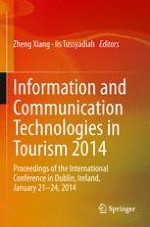2013 | OriginalPaper | Chapter
Facebook it: Evaluation of Facebook’s Search Engine for Travel Related Information Retrieval
Authors : Paul Bulencea, Roman Egger
Published in: Information and Communication Technologies in Tourism 2014
Publisher: Springer International Publishing
Activate our intelligent search to find suitable subject content or patents.
Select sections of text to find matching patents with Artificial Intelligence. powered by
Select sections of text to find additional relevant content using AI-assisted search. powered by
